Related Research Articles
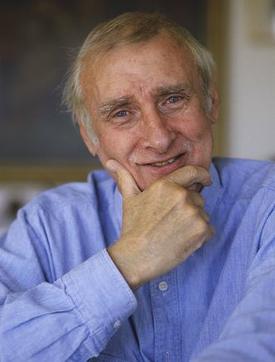
Terence Alan "Spike" Milligan was an Irish comedian, writer, musician, poet, playwright and actor. The son of an English mother and Irish father, he was born in British Colonial India, where he spent his childhood before relocating in 1931 to England, where he lived and worked for the majority of his life. Disliking his first name, he began to call himself "Spike" after hearing the band Spike Jones and his City Slickers on Radio Luxembourg.

The Goon Show is a British radio comedy programme, originally produced and broadcast by the BBC Home Service from 1951 to 1960, with occasional repeats on the BBC Light Programme. The first series, broadcast from 28 May to 20 September 1951, was titled Crazy People; subsequent series had the title The Goon Show.
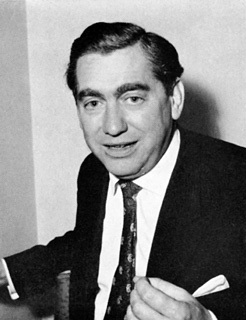
Anthony John Hancock was an English comedian and actor.

Francis Alick Howard, better known by his stage-name Frankie Howerd, was an English actor and comedian.
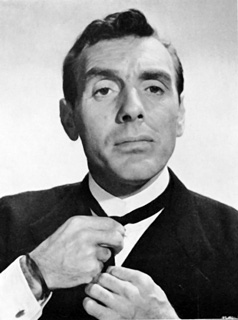
Eric Sykes was an English radio, stage, television and film writer, comedian, actor and director whose performing career spanned more than 50 years. He frequently wrote for and performed with many other leading comedy performers and writers of the period, including Tony Hancock, Spike Milligan, Tommy Cooper, Peter Sellers, John Antrobus and Johnny Speight. Sykes first came to prominence through his many radio credits as a writer and actor in the 1950s, most notably through his collaboration on The Goon Show scripts. He became a TV star in his own right in the early 1960s when he appeared with Hattie Jacques in several popular BBC comedy television series.

Ray Galton OBE and Alan Simpson OBE were English comedy scriptwriters whose partnership lasted over 50 years. They met in 1948 whilst recuperating from tuberculosis at the Milford Sanatorium, near Godalming in Surrey. They are best known for their work with comedian Tony Hancock on radio and television between 1954 and 1961 and their long-running television situation comedy, Steptoe and Son, eight series of which were aired between 1962 and 1974.
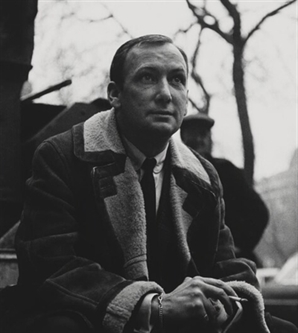
Johnny Speight was an English television scriptwriter of many classic British sitcoms.

Robert Colin Stigwood was an Australian-born British-resident music entrepreneur, film producer and impresario, best known for managing Cream, Andy Gibb and the Bee Gees, theatrical productions like Hair and Jesus Christ Superstar, and film productions including the successful Grease and Saturday Night Fever. On his death, one obituary judged that he had been for a time the most powerful tycoon in the entertainment industry: "Stigwood owned the record label that issued his artists’ albums and film soundtracks, and he also controlled publishing rights – not since Hollywood's golden days had so much power and wealth been concentrated in the hands of one mogul."

Q... is a surreal television comedy sketch show written by Spike Milligan and Neil Shand, and starring Spike Milligan with supporting players, usually including Julia Breck, John Bluthal, Bob Todd, and John Wells. The show ran from 1969 to 1982 on BBC2. There were six series in all, the first five numbered from Q5 to Q9, and a final series titled There's a Lot of It About. The first and third series ran for seven episodes, and the others for six episodes, each of which was 30 minutes long.

Brian Todd, known professionally as Bob Todd, was an English comedy actor, mostly known for appearing as a straight man in the sketch shows of Benny Hill and Spike Milligan. For many years, he lived in Tunbridge Wells, Kent.
The Idiot Weekly, Price 2d was the first real attempt to translate the humour of The Goon Show to television. It was made by Associated-Rediffusion during 1956 and was broadcast only in the London area.
John Arthur Antrobus is an English playwright and screenwriter. He has written extensively for stage, screen, TV and radio, including the epic World War II play, Crete and Sergeant Pepper at the Royal Court. He authored the children's book series Ronnie, which includes Help! I am a Prisoner in a Toothpaste Factory.

Up the Chastity Belt is a 1971 British comedy film directed by Bob Kellett and starring Frankie Howerd. It was a spin-off from the TV series Up Pompeii!
Beryl Frances Vertue was an English television producer, media executive, and agent. She was founder and chairman of the independent television production company Hartswood Films.

Up Pompeii is a 1971 British sex comedy film directed by Bob Kellett and starring Frankie Howerd and Michael Hordern. The film was shot at Elstree Film Studios, Borehamwood, England and is based on characters that first appeared in the British television sitcom Up Pompeii! (1969–1975).

James Douglas Grafton, was a producer, writer and theatrical agent. He served in World War II as an officer in the Bedfordshire and Hertfordshire Regiment and was awarded the Military Cross for his actions during Operation Market Garden.

Patrick "Pat" Kenneth Macneile Dixon was an English radio producer for BBC Radio.
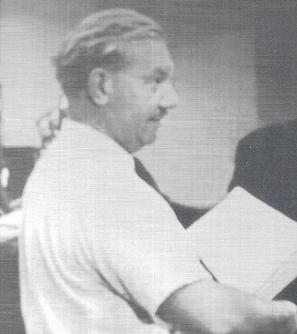
Peter Randolph Eton was a producer for BBC radio and television. He was invalided out of the navy after being wounded during the Dunkirk evacuation and joined the BBC.

Lawrence Geoffrey Stephens was a BBC radio scriptwriter, best remembered for co-writing The Goon Show with Spike Milligan. Stephens was a regular writer of the show for the first two years, and then returned to The Goon Show to assist Milligan. From his association with Milligan, Stephens became involved with Associated London Scripts (ALS), and was said to have been "one of the most eye-catching characters, in the earliest days of the company...he played a significant cameo role in the first phase of success for ALS".

Graham McCann is a British author and historian who has written extensively on film and television stars and British comedy series. He is a former lecturer and fellow at the University of Cambridge where he taught social and political theory. McCann has become noted for his biographies on figures such as Cary Grant, Marilyn Monroe, John Le Mesurier, Woody Allen and Terry-Thomas, and books about British television comedy such as Dad's Army, Yes, Minister, Only Fools and Horses and Fawlty Towers. He also contributes to various newspapers.
References
- ↑ McCann, Graham (2006). Spike & Co: Inside the House of Fun with Milligan, Sykes, Galton & Simpson. London: Hodder & Stoughton. ISBN 978-0-340-89808-6 – via Internet Archive.
- ↑ Carpenter, Humphrey (2003). Spike Milligan: The Biography. London: Hodder & Stoughton. p. 155. ISBN 978-0-340-82611-9 – via Internet Archive.
- ↑ Carpenter 2003, p. 156-159.
- 1 2 "Associated London Scripts". BBC Radio 4 . Retrieved 12 October 2023.
- ↑ Galton, Ray; Simpson, Alan (23 January 2009). "Interview: Galton & Simpson" (Interview). Den of Geek . Retrieved 12 October 2023.
- ↑ Carpenter 2003, p. 209.